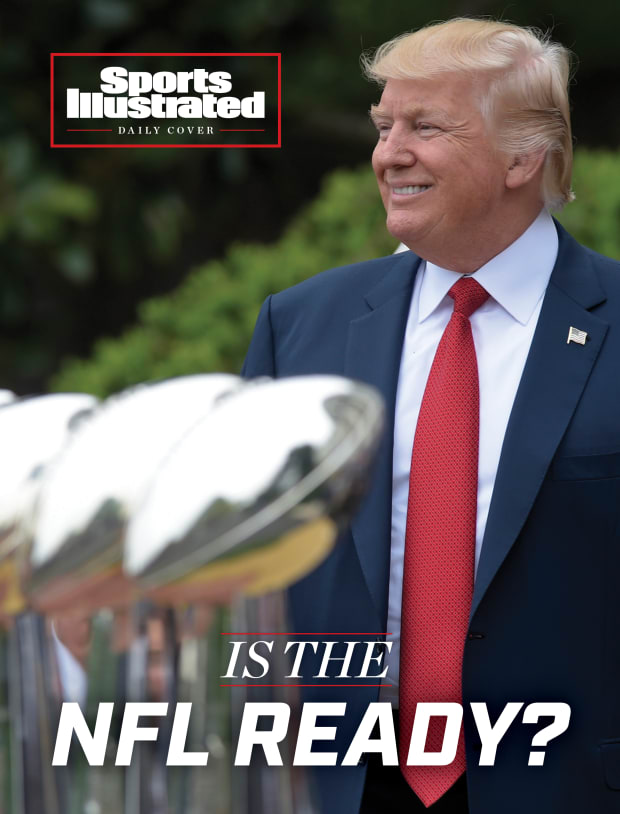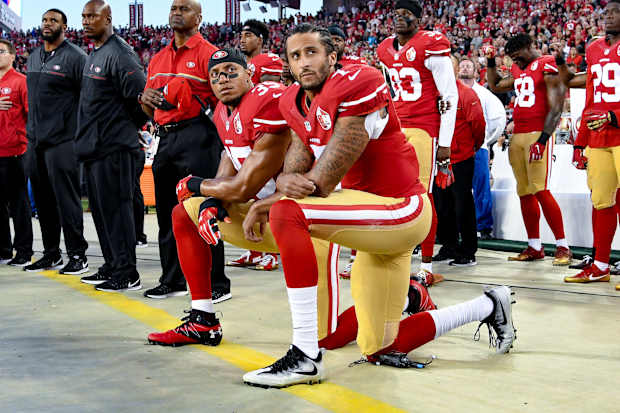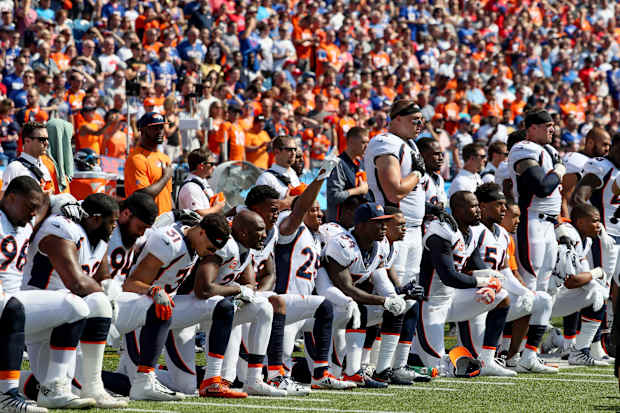We regretfully interrupt this typically joyful moment of time on the NFL calendar, as teams file back into their buildings for training camps, to ask a difficult question that may have been lingering in the back of our collective minds, one we did our best to keep dormant until now.
The following is not a political endorsement or ideological finger-pointing. We are not rehashing the previous term or delving into issues of morality. There will be plenty of time and space for that later.
Instead, this is a question of preparedness, of fitness. It’s a question for coaches and general managers and player agents and—overwhelmingly—team owners. What did we learn from 2016 to ’20? Let’s assume everyone gets a free pass and that no Republican, Democrat or Freak Power party member could have predicted what shape the world would take under a Trump presidency.

Susan Walsh/AP
Is the NFL ready for the return of Donald Trump?
Can the league ensure it will not again be a cowering minnow trying to keep itself from the open mouth of a passing-by shark, like when it altered its national anthem policy in the wake of criticism from the former president? During Trump’s campaign and presidency, he successfully convinced supporters that a television ratings dip across the board (thanks to the rise of streaming services and other cable-cutting mechanisms) was proof that fewer people were watching the NFL because of Colin Kaepernick. Actually, it was because of Trump and his now infamous speech in which he implored NFL owners to fire kneeling players, saying: “Get that son of a b---- off the field right now. Out! He’s fired. He’s fired!” It was a sleight of hand, for sure. It was also a successful tool to promote his cause and stoke his base.
Midterm elections are 103 days away, which means we are mere footsteps from the start of another charged bit of mudslinging, and Trump will surely be on the campaign trail for his desired candidates. We are going to have amplified for us every potentially divisive issue imaginable. We are going to be told that if you believe in X, you cannot vote for Y, and so on and so on. We are going to argue about world conflict, public health and safety, women’s rights, economics, gas prices, immigration, racial inequality and the state of our country as a free and fair society. All of those issues will be neatly skewed and distilled for us by our preferred news outlets, bringing us to the public octagon ready to throw hands.

Thearon W. Henderson/Getty Images
NFL players have become a vehicle for discussion, awareness and collective action, all of which took some teams by surprise six years ago. I remember talking to one coach who feared for players demonstrating during the national anthem, not because of any ideological difference, but because there was nothing they could do to protect the players if that team’s owner wanted them gone. The temperature in team facilities was higher than we understood at the time.
If we remember correctly, there was so much awkwardness. Before teams became reluctant, corporate-style partners to various progressive causes, they ranged from outright impediment to or strategic ignorance of any potentially divisive action.
Pointing out that President Joe Biden and former president Trump are stylistically different should not be controversial. Indeed, Biden hinged the hopes of his campaign on a presidency that would rein in the noise instead of amplify it. His only brief shoulder brush with the NFL so far came from a quip about Aaron Rodgers’s vaccination status, which Rodgers loudly rebuked in a pre-playoff interview with ESPN. It also shouldn’t be controversial to point out that Trump, more than any president in recent history, pulls from the pop culture universe in an effort to help him craft more relatable points. This is how Kaepernick’s silent protest of racial inequality and police brutality became a national flash point, with Trump using the demonstration as a way to promote a campaign that would frame your opinion on law enforcement tactics and practices as a matter of good and evil, of pro-country and anti-country.
While Kaepernick’s efforts have largely softened society’s stance—athletes demonstrating, speaking out or raising awareness of issues has become commonplace now—they also represented some modicum of success for Trump. Owners were supposedly buried under mountains of fan mail. Kaepernick became unsignable. The idea of removing politics from sports—which really meant removing the kind of politics I disagree with from sports—became a popular battle cry.

While not a direct parallel, the tactic seems to be standard politically now (and probably, in some lesser sense, always was). Republican Florida Governor Ron DeSantis is battling the Disney corporation (firmly in bed with the NFL as a content partner and owner of ESPN) over its opposition to the state’s Parental Rights In Education—or 'Don’t Say Gay'—bill, in what is largely a culture war meant to appease voters in a Trumpian style.
What could Trump latch onto now?
Sports are an important part of the former president’s daily life and consumption habits. Despite pleas from the families of 9/11 victims, Trump spent the past week lauding LIV Golf, a Saudi-backed enterprise looking to dismantle the PGA and steal all its top talent, and urging PGA tour players to take the startup’s money before an inevitable merger.
The rhetoric will become more heated the closer we get to Nov. 8 and the closer Trump comes to finding his way back to mainstream social media and a stranglehold on the daily news cycle, especially if he decides to run for president in ’24. In recent months, the congressional investigation of Commanders owner Daniel Snyder has turned into outright political theater, with NFL commissioner Roger Goodell being asked by Republican senators about the team’s fine of defensive coordinator Jack Del Rio for referring to the attack on the U.S. Capitol on Jan. 6, 2021, as a “dust-up,” and about the NFL’s banning of Barstool Sports founder Dave Portnoy from covering its events. (Goodell said he wasn’t familiar with the latter issue).
The NFL is an extraordinarily popular microcosm of society, which means our problems inside these walls are some version of the problems the country faces at large. There are high-profile issues of racial inequality making their way through the courts in relation to the NFL, via the Brian Flores suit. Trump could find sympathy for the similarly raw Jon Gruden, who saw his coaching career come to an end over leaked documents revealing racist, anti-LGBTQ and misogynistic language. (Trump has repeatedly made an issue of leaked documents and utterances in meetings during his presidency, apparently believing the leaks and not the content of the leaked material was the problem.) The NFL is investigating credible accusations of tanking amid a gambling boon, and we all know how much the former president enjoys pointing out an institution he finds “rigged.”

David E. Klutho/Sports Illustrated
In 2020, Falcons owner Arthur Blank topped all fellow owners with more than $1.1 million in donations heading to Democratic causes. The financial support for Trump waned noticeably in comparison to the ’16 election cycle, with retired Raiders guard Richie Incognito personally donating nearly as much to the outgoing president directly ($11,549) as most all other NFL personnel combined ($14,738).
This certainly doesn’t shield the NFL from any criticism. Trump was, and always will be, a business person with confrontational tendencies. If he views the league as against him, he won’t hesitate to yank it into this culture war.
We often wonder whether the NFL is evil, incompetent or, perhaps, still incredibly surprised and incapable of grasping its mammoth reach within society. The last of the three might be true, given the league’s consistent inability to see beyond the financial recourse of its actions. Rarely does the NFL heed warnings. However, the rise of Trumpism is another real speedbump (others being player concussions and domestic violence) for the league amid its massive climb to American Sports Monolith. What happens, after two years of strategizing with a broader political network, a mainstream party supporting his every move and a political war chest greater than both the Republican and Democratic parties?
The NFL will be fine, ultimately. It is too big to truly fail. But that doesn’t mean the league will enjoy sweating it out when that status is, even momentarily, in jeopardy. Perhaps it’s time to make a plan.







